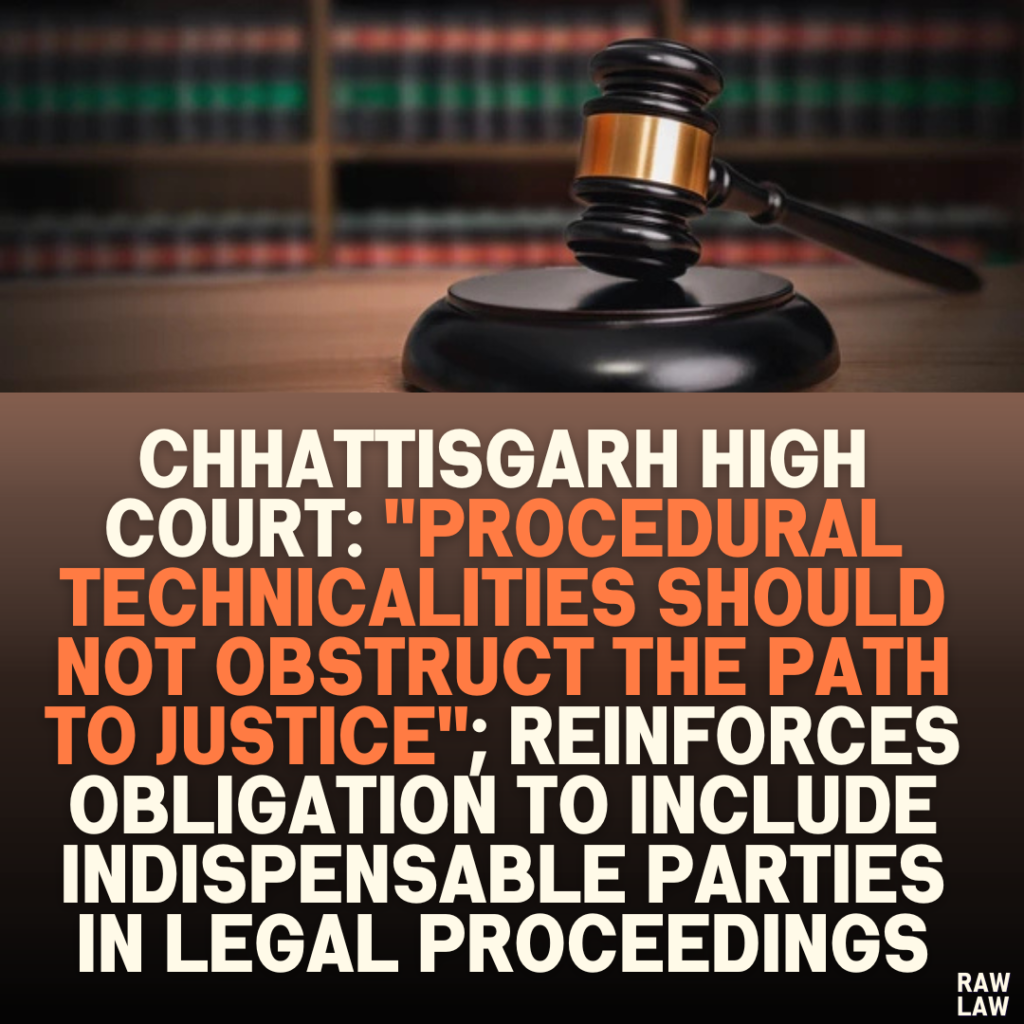Court’s Decision:
The Chhattisgarh High Court set aside the decision of the Claims Tribunal, which had dismissed an application to implead United India Insurance Company Limited as a party in a claim case. The High Court directed the Claims Tribunal to reconsider the application and allow the insurance company to be added as a necessary party for the proper adjudication of the case.
Additionally, the High Court stayed the trial court’s proceedings until the application for impleadment was decided.
Facts:
- Background of the Petition:
- The petitioner, a general insurance company, had issued a policy covering its own damage but was not responsible for third-party liability concerning the offending vehicle involved in an accident.
- The third-party insurance policy for the offending vehicle was issued by United India Insurance Company Limited, effective from October 26, 2018, to October 25, 2021.
- Dispute:
- During the trial at the Claims Tribunal, the petitioner argued that United India Insurance Company Limited, being the insurer for third-party liability, was a necessary party for adjudicating the claim case.
- The petitioner filed an application under Order 1 Rule 10(2) of the Code of Civil Procedure (CPC) to include United India Insurance Company Limited in the proceedings. However, the Tribunal dismissed the application on procedural grounds, specifically citing that the petitioner had not filed its written statement.
- Petition:
- Aggrieved by the dismissal, the petitioner approached the High Court under Article 227 of the Constitution, seeking redress and claiming that the Claims Tribunal erred in rejecting the application.
Issues:
- Was United India Insurance Company Limited a necessary party for the fair adjudication of the claim case?
- Did the Claims Tribunal err in dismissing the application on the procedural ground of non-filing of the written statement?
Petitioner’s Arguments:
- Necessity of United India Insurance Company Limited:
- The petitioner emphasized that the third-party insurance policy for the offending vehicle was issued by United India Insurance Company Limited. Therefore, its involvement was essential for determining liability.
- Challenge to Tribunal’s Reasoning:
- The petitioner argued that the dismissal of the application on the sole ground of non-filing of the written statement was unjust and contrary to the principles of natural justice. It contended that procedural shortcomings should not prevent the inclusion of a necessary party.
Respondent’s Arguments:
The judgment does not provide details of the respondents’ arguments. It appears the case primarily revolved around the procedural decision of the Claims Tribunal.
Analysis of the Law:
- Order 1 Rule 10(2) CPC:
- This provision allows the court to add or strike out parties as deemed necessary for ensuring the effective and complete adjudication of the dispute. The law prioritizes substantive justice over procedural technicalities.
- Fair Adjudication:
- The court recognized that the presence of United India Insurance Company Limited was crucial to determining liability in the claim case. Its absence could result in an incomplete resolution, potentially prejudicing the rights of the parties involved.
- Judicial Discretion:
- The court held that the Tribunal’s reliance on procedural grounds (non-filing of the written statement) was misplaced. The broader objective of including all relevant parties should have taken precedence.
Precedent Analysis:
Though the judgment does not explicitly cite prior rulings, it aligns with the established principle that procedural technicalities should not obstruct the path to justice. Courts have consistently emphasized that necessary parties must be included to avoid multiplicity of proceedings and ensure a holistic resolution.
Court’s Reasoning:
- Necessity of United India Insurance Company Limited:
- The High Court highlighted that United India Insurance Company Limited, as the issuer of the third-party insurance policy, was an indispensable party. Without its inclusion, the claims case could not be adjudicated effectively.
- Improper Dismissal by the Tribunal:
- The High Court found that the Claims Tribunal had wrongly prioritized procedural deficiencies (non-filing of the written statement) over the substantive need for a fair trial.
- The dismissal of the application was deemed contrary to the principles of justice.
- Directive to Reconsider:
- To rectify the procedural lapse, the High Court ordered the Tribunal to allow the impleadment of United India Insurance Company Limited and decide the case afresh with all necessary parties.
Conclusion:
The High Court:
- Directed the Claims Tribunal to allow the application for impleadment and issue notice to United India Insurance Company Limited.
- Stayed the trial court proceedings until the application for impleadment was adjudicated.
- Ordered the petitioner to pay the necessary process fees within 15 days to facilitate the impleadment process.
- Directed the Claims Tribunal to complete the process within 45 days.
Implications:
- Strengthening the Role of Necessary Parties:
- This decision reinforces the obligation to include all indispensable parties in legal proceedings to ensure justice is served.
- Balancing Procedure and Substance:
- The judgment highlights the judiciary’s commitment to prioritizing substantive justice over procedural formalities.
- Guidance for Lower Courts:
- The ruling serves as a reminder to trial courts and tribunals to exercise judicial discretion pragmatically, avoiding decisions that may result in incomplete adjudication.




Pingback: Supreme Court Upholds Widow’s Entitlement to Liberalised Family Pension, Expands Definition of ‘Battle Casualty’ to Include Deaths Due to Extreme Climatic Conditions Near Line of Control: “Decision-Making Authorities Must Adopt a Sympathetic Appro
Pingback: Delhi High Court Allows Conditional Release of Funds to National Sports Federations, Emphasizes Strict Safeguards to Prevent Misuse and Promote India's 2036 Olympics Bid - Raw Law